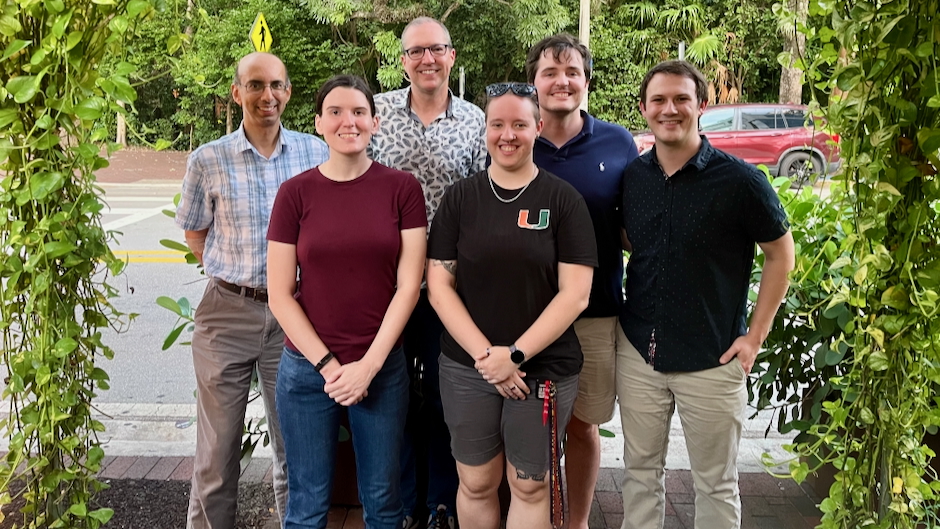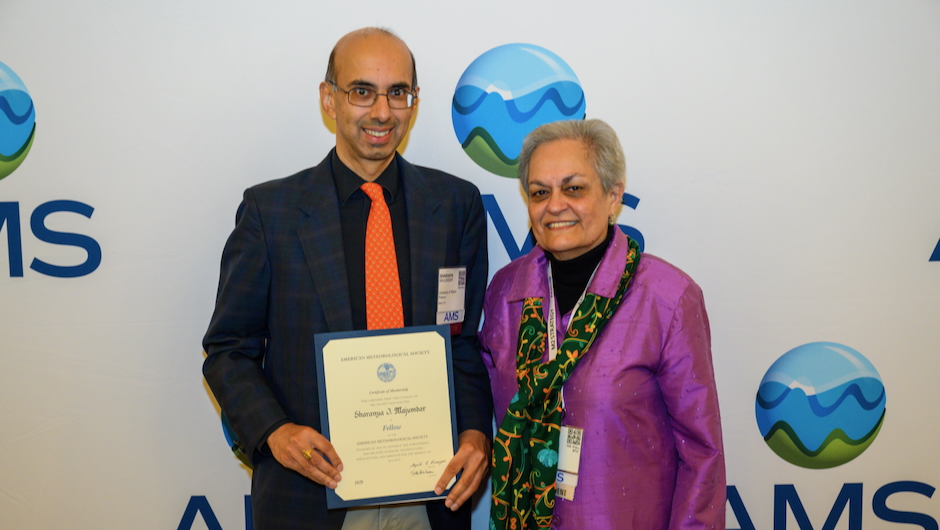Sharan Majumdar, a University of Miami atmospheric scientist whose research on the predictability of tropical cyclones has increased our understanding of hurricanes and improved storm forecasting, has been elected a Fellow of the American Meteorological Society (AMS).
Majumdar, a professor in the Department of Atmospheric Sciences at the University’s Rosenstiel School of Marine, Atmospheric, and Earth Science, accepted the honor at AMS’s recent annual meeting in New Orleans, Louisiana.
“I’m honored to be recognized for my scientific contributions and service. I am grateful to the people who nominated me, and the AMS Council who elected me.” said Majumdar. “This Fellowship means a lot because it is a career award integrated across 27 years in a large profession that serves society. I am also grateful to my colleagues and the leadership at the University of Miami and the Rosenstiel School for providing a supportive system that enables the continued success of our students and faculty.”
Majumdar has spent most of his career investigating hurricanes. His research group tackles problems on the science and predictability of their genesis, structure, and intensification. Other contributions include exploring new methods for assimilating aircraft and satellite data to produce better forecasts and designing effective ways to communicate hurricane risks to the public.
“A general theme of our work has always been research with practical and operational implications,” he said.
Each year, AMS recognizes people who have made exemplary contributions to the advancement of atmospheric and related sciences, technologies, applications, and services for the benefit of society. Only a select few of AMS’s 12,000 members—two-tenths of one percent, to be precise— are approved as Fellows each year.
For 10 consecutive years, Majumdar co-chaired a data assimilation conference at the AMS Annual Meeting. He also led two World Meteorological Organization community reviews on targeted observations and modeling of high-impact weather. He currently serves as a visiting scientist at the European Centre for Medium-Range Weather Forecasts (ECMWF).
“Sharan is a highly accomplished professor who has been strongly involved in service to the AMS and other global weather agencies,” said Majumdar’s longtime colleague, David Nolan, a professor in the Department of Atmospheric Sciences at the Rosenstiel School.
Majumdar grew up in England, in the historic town of St. Albans, where the mostly overcast and drizzly weather didn’t spark his interest in meteorology. He pursued mathematics and figured that in doing so, he would eventually be able to apply his mathematics to interesting and challenging problems.
In between completing his bachelor and doctoral degrees in mathematics at the University of Cambridge, Majumdar did a summer internship in atmospheric and marine science at the Commonwealth Scientific and Industrial Research Organization in Melbourne, Australia.
“The internship was a life-changing experience and my first opportunity to learn about the importance of the atmosphere and ocean, and the tremendous impact they have on society,” he said.
Majumdar went on to complete his doctoral degree at Cambridge University in aeronautical acoustics, funded in part by Rolls-Royce, who manufacture aircraft engines as well as cars. His doctoral research assisted them in developing quieter engines so airports could meet strict noise regulations. His focus was on furthering a theoretical prediction scheme to model the noise generated by engines during take-offs and landings.
During his undergraduate internship in Australia, he met one of his lifelong mentors, atmospheric physicist Craig Bohren. A distinguished professor emeritus of meteorology at Penn State University, Bohren is the author of several books on atmospheric thermodynamics and radiation. The two met while waiting for a train. They began the first of many lifelong conversations as part of a friendship that has endured for over three decades. To this day, Majumdar credits Bohren with inspiring him on how to mentor his students.
Majumdar has played a key role in developing the Rosenstiel School’s Department of Atmospheric Sciences graduate and undergraduate programs, leading recruitment efforts at AMS meetings for 15 years and promoting the school during his frequent travels. Regardless of how hectic his schedule and research commitments may be, Majumdar has always committed himself to making students his top priority. He holds weekly meetings with them to ensure they feel supported in their research and academic life.
From 2013-2016, Majumdar served as the Director of two graduate programs and chair of the Rosenstiel Graduate Academic Committee. From 2016-2019, he served as the Associate Dean of Graduate Studies at the Rosenstiel School. He led the reform and implementation of several new Ph.D. and Master’s degree programs, which helped attract many highly qualified students.
“Sharan taught me how to take ownership of my own research. He let me explore problems and tackle new methods on my own but was always there in support,” said Quinton Lawton, one of Majumdar’s recent Ph.D. graduates and a postdoctoral researcher at the National Science Foundation National Center for Atmospheric Research in Boulder, Colorado.
Lawton credits Majumdar with instilling in him the importance of collaborative scientific research and connecting with external institutions to pursue exciting scientific questions. While completing his Ph.D., Lawton was lead author of a study in collaboration with ECMWF and Majumdar in which they showed how large-scale waves in the atmosphere (Kelvin waves) make hurricane formation more likely. “The skills I learned from Sharan have greatly helped me develop as an independent and collaborative researcher,” Lawton added.
In 1996, Majumdar visited Penn State to present his doctoral research at an acoustics conference and to visit Bohren. Shortly after, he was invited to join Penn State’s Department of Meteorology to work on targeted observations as a post-doctoral researcher with Craig Bishop, who had recently joined their faculty. Later, on a summer colloquium on hurricanes in Miami, he met Bruce Albrecht, the co-author of Bohren’s Atmospheric Thermodynamics textbook, and an expert on clouds. Albrecht had just been hired by the Rosenstiel School to grow its new graduate and undergraduate programs in meteorology. That encounter, and those with scientists from NOAA’s Hurricane Research Division, set Majumdar onto the path of tropical weather research which led to his faculty appointment at the Rosenstiel School in 2002.
Once at the Rosenstiel School, Majumdar made immediate contributions to its academic offerings, teaching undergraduate and graduate courses that included Introduction to Weather Forecasting and Atmospheric Dynamics I & II, and latterly Tropical Weather and Forecasting, Hurricanes, and Predictability. He developed the last three courses himself.
“Sharan has a unique ability to make classroom materials accessible and understandable to students,” Lawton said. “His course materials typically include a practical element, such as interactive assignments or class projects, that help solidify knowledge and allow students to connect classroom learning with real-world problems.”
In addition to his leadership at the Rosenstiel School, Majumdar recently co-led the development and launch of the University of Miami’s Climate Resilience Institute and served as its interim co-director.
He credits his career success to his current and former students and collaborators, several beloved mentors, and various national and international organizations including the AMS.
“Sharan’s research has helped improve our understanding of how, when, and why hurricanes form, greatly contributing to our ability to forecast these storms,” Lawton said. “This has important impacts on weather forecasting, and I believe Sharan’s research has contributed to our field’s ability to keep people safe from these storms.”

Majumdar research group: Left to right: Sharan Majumdar, Alexis Wilson, Brian McNoldy, Samantha Nebylitsa, Will Downs, Quinton Lawton.

